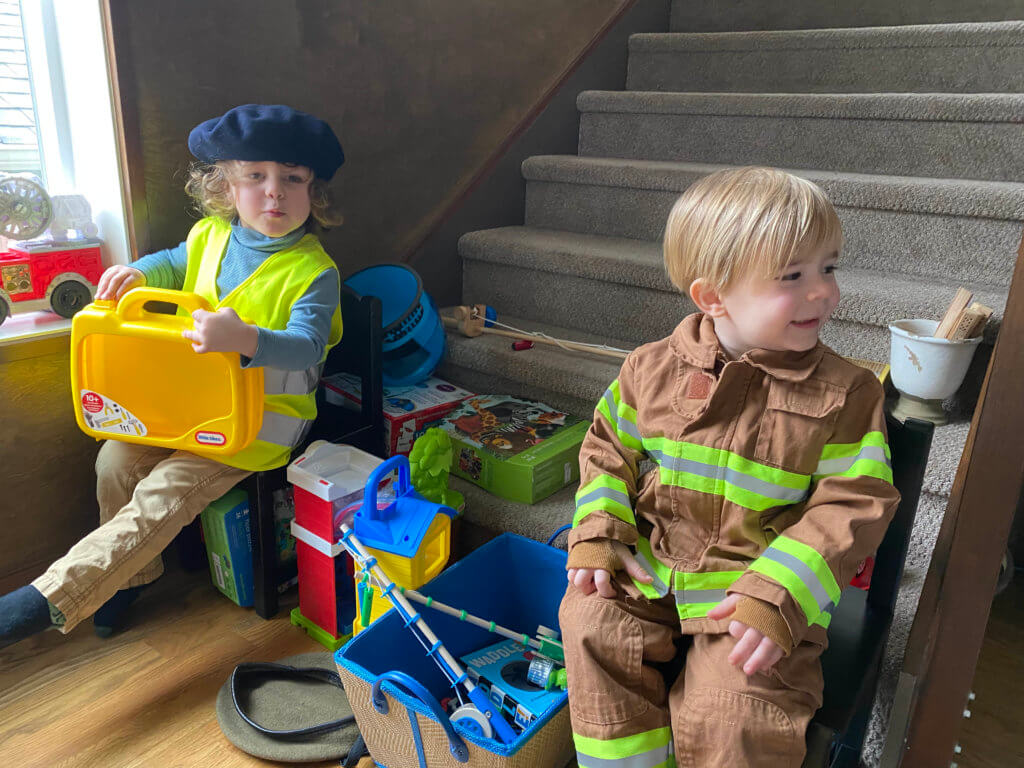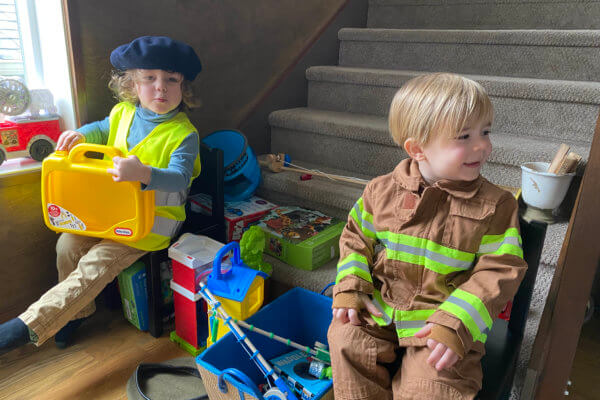Embracing pretend play with kids
It’s been a bit of a surprise for me over the last few years to realize that playing pretend isn’t as easy as I once thought. I know I sure enjoyed it as a child, but as an adult it can feel just a bit tedious, repetitive, and perhaps is not the most engaging part of the day. However, playing pretend with your nanny kiddos is a great way to build connection! I also see pretend play really building those life skills that we want to see in our nanny charges when they are adults. The good news is, just like anything else, pretend play gets easier with practice! The more you buy-in, the more fun you’ll have.
Here are some of my favorite easy pretend play ideas for kids:
Follow the child’s lead
I’d encourage you to follow the child’s lead when it comes to play time. What a great way to engage the child’s imagination and take the pressure off you to come up with play ideas!
Pretend play as practice
Does the child have an important life event coming up? A big trip or a visit to a doctor or dentist? Are they nervous, stressed or worried about something new? Maybe they are about to start a new school, a new grade or a new activity. Pretend play is key to practice and will help the child and the whole family feel prepared!
If you’re looking for some new ideas or if you’ve been out of practice in the world of pretend since you were a child, here’s a few of my favorites to get you started.
Camping
My absolute favorite imaginary game with the preschooler I care for right now is when we pretend we are camping! We turn off the lights, lay her sleeping bag down on the floor, and the camping adventure begins. I follow her lead, and all kinds of things can happen! On some camping trips, we go walk around the imaginary woods and have encounters with (stuffed) animals – hurt bunnies, scary tigers, you name it! Other times we get cozy and read some of our favorite picture books by flashlight. We use the glow-in-the-dark stars on her ceiling to stargaze, and sometimes I put a video of a crackling campfire on my phone to really set the mood. After a full day of camping adventures, she gets cuddled up in her sleeping bag with the animal friends we’ve made that day, and she pretends to fall asleep. I can never say no to a pretend camping trip!
School
What better way for a young child to work out some nerves about starting school than practicing what that school day might look like! I come from a teaching background, and I really relish our pretend school time. Sometimes I’m the teacher and sometimes I’m the student. We invite stuffed animals, dolls, and character toys to be the other kiddos. We can use an easel, or we read picture books, or print out worksheets or coloring sheets to work on. We role play different situations.
What might it sound like if you need to use the bathroom at school?
What would you say if someone is in your space?
How do you assertively ask for help when you need it?
How will we wash our hands and get the food out of our lunchbox at lunch time?
Let’s practice!
I don’t mind packing snacks and backpacks up for a busy day of pretend school!

Travel
Much like a pretend day of school, work out some jitters before a trip by practicing with pretend play! Here’s one of my favorite Sproutable videos of Juliettta showing us what role playing an airplane ride looks like. Prepare them for those loud sounds, how quick the airplane moves, and what the pilot and flight attendants might sound like. I’ve also arranged chairs and crafted paper steering wheels to facilitate pretend bus rides. You can talk about how the windows work, why buses don’t have seatbelts, and for the other people who may sit around us. Take turns being the bus driver & passenger.
All of this preparation feels like playtime to a child but is meaningful practice and will put them at ease when it’s time for the real thing.
Zoo
Making a pretend zoo has been such a hit for me in the past, especially if you’re working with a larger group of children or have some mixed-age siblings. Gather all of the stuffed animals and animal figures and toys that you can scrounge up. Let the children sort them into categories that make sense to them, and figure out where each habitat will be. Our pretend zoo has typical zoo animals, but also dogs and cats, a whole ocean, and a huge insect area because those are the toy animals we have. Add a little literacy practice by making hand-written signs for each habitat and animal or add some art by decorating their habitats with appropriate foliage. Once your zoo is set-up, have someone be the zoo keeper and other people be visitors touring the animals. Talk about why and how we treat the animal kindly.
Add a little counting practice by grabbing some cereal and feeding each animal a certain amount of Cheerios! Do the kiddos want to be animals too? What about a special large-animal vet?
Add some problem solving by asking: which enclosures can be near to each other? Who needs a colder area and which animals prefer hot weather? This is a pretend game that can be ever-evolving and last all day long!
Grocery Store & Errands
Children love to pretend to do the things they see their adults do! Many of the preschoolers I’ve cared for really enjoyed playing grocery store. This can be a game that includes lots of props like cash registers, play money, and getting out pretend or real food items, or it can be all imagination-based. They don’t seem to mind either way! Grocery store pretend play can be another game where you can practice skills like counting, identifying coins and money, sorting objects, and speaking to others.
Throw in some problems for them to solve:
What if you’re shopping and need something for a recipe that you can’t find?
What if you don’t have enough cash for your groceries?
What do we do if an item is out of stock?
Other errands can be fun pretend play, too! I remember setting up a large area for dramatic play of a pumpkin patch for some toddlers a few years ago. It was hilarious watching them interact with each other! I’ll never forget one 2 ½ year old nanny charge asking the other 2 ½ year old in our nanny share for “two pumpkins please, pumpkin lady!”
Work
Young children also enjoy playing with other aspects of adult life. It’s so funny to hear their takes on what we adults do all day. I know a child who enjoys typing on her play laptop and complaining about sending “boring emails” all day while she pretends to drink coffee and takes calls from her boss, and her friends Rapunzel, Ariel, and Cinderella. I’ve also had fun getting baby dolls out and pretending that we work at a daycare together or that we are chefs making “royal lunches” for kings & queens while we’re whipping up some macaroni and cheese for ourselves.
Symbolic Play & Loose Parts
Symbolic play is when children start using objects to represent other objects and can be huge for pretend play! For example, this is when we use a generic wooden block for a telephone, or we pretend that a paper plate is the steering wheel on our spaceship. Symbolic play opens the door for a whole world of imagination because now anything can be a representation of what is needed in their pretend world. Lean in and resist reminding them of the “correct” use for items they’re using symbolically. Reggio-inspired educators and nannies know the beauty of collecting and offering loose parts for play which can add even more creative and STEM elements to children’s play.
Pretend play can be short & easy too.
You can pretend you’re brushing Rapunzel’s tangly hair in the morning. You can pretend you’re elephants stomping out to the car or jaguars running to the bathroom. Imaginary play can be something that takes just one moment to break up the monotony of the day or can be focused and in-depth, lasting for hours, involving all kinds of props and toys, and changing on the child’s whim! There are just no limits with pretend play!
Benefits of pretend play
The benefits of pretend play are truly so numerous. Scholastic says that using their imagination helps children build their vocabulary and language skills while giving them the opportunity to be problem solvers. Psychology Today explains that pretend play improves emotional competence, fosters social skills, and builds emotional regulatory skills. Research has shown over and over that pretend play is critical for children. Berk, Mann & Ogan, (2006) and Hirsh-Pasek, Golinkoff, Berk, & Singer (2009) suggest that pretend play helps with reduced aggression, delay of gratification, civility, and empathy!
So, not only are you building connection & your relationship with your nanny charges once you delve into the world of imaginary play with them, you’re also fostering those life skills we are always working on: problem solving, emotional competence, social skills, emotional regulation, delayed gratification, civility, and empathy! That’s a whole lot of benefits for something that takes no financial cost and can be done anywhere and anytime.
Jump in and do some pretend play today!





Comments
i love puppys
amanda